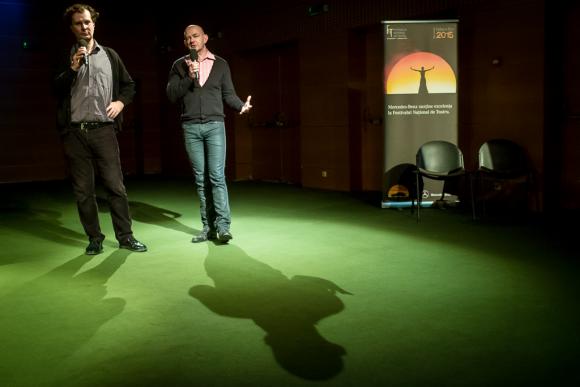de fnt.ro

În cadrul manifestărilor care au loc cu ocazia celei de a 25-a ediţii a FNT, ieri a avut loc conferinţa “Teatrul şi memoria – 250 de ani de teatru de stat în Polonia”, la Sala Media a Teatrului Naţional.
28 October 2015, Articles
October 28th 2015
Among the side-bar events of this 25th edition of the National Theatre Festival, a conference titled” Theatre and Memory- 250 years of public theatre in Poland” took place yesterday at the Media Hall of the National Theatre Bucharest.
An article by Florina Tecuceanu
The conference was presented by playwright and theatre critic Piotr Gruszczynski and was followed by the screening of the film “(A)pollonia”, directed by Kryzsytof Warlikowski, an event offered by the Polish Institute, the National Audiovisual Institute and the Theatre Institute in Warsaw.
Piotr Gruszczynski and Tomasz Kluz, project coordinator of the Polish Institute Bucharest talked about memory in Polish theatre. “Collective memory of the creators is a topic that is often approached in Polish theatre. There always is an open space somewhere in between memory and theatre. I am happy for this presence of Polish theatre at this edition of the NTF and we hope to have it again in the future, live”, said Tomasz Kluz, who also mentioned that the most recent (having premiered two months ago) performance about memory in Poland was “The French” an adaptation after Proust’s “In Search of Lost Time”.
The audience present at the conference learned on this occasion that there were a few researchers in Polish theatre, who studied the collective memory of the Second World War. Best known is Tadeusz Kantor, who understood memory the same way Proust did and who defined it as a childhood room. Through this childhood room, the spectator could look inside the memory of the artist.
Retrieving of memory, an important point in Polish theatre
“In Kantor, we find the memory of the Second World War, that of multicultural Poland. As in Proust, the experience of memory is visible, but the Kantor Method is more untrusting than that of Proust”, playwright Piotr Gruszczynski said.
Collective memory was repressed in the time of the biggest worldwide conflagration. After 1989, artists were offered freedom of speech, but retrieving this forgotten memory became a necessity.
One of the most dangerous and falsified topics in Poland were the relationships between Polish people and Jews. Prior to the moment 1989 one was taught in school that millions of Polish people, not Jews, were killed in Auschwitz, Piotr Gruszczynski pointed out, thus revealing the fact that it’s necessary now to work again on that and reverse the process of falsification. The fact that, for a long time, Poland was divided, the Polish people have identified themselves as victims of history. Another cliché that was evoked was the image of the Polish helping Jews during Nazi persecution and risking their lives.
Theatre can work on traumas
„We do not want to speak about this- about the fact that many Polish people have been part of the pogroms, during and after the war”, the speaker mentioned.
Jan T. Gross, American historian of Jewish descent published a document in 2000, in Polish and in English, a description of the moment when 300 Jews were burnt in a small Polish village.
„There were many such cases and some were described in one of the books written by the American researcher. The system through which the locals tried to obtain the gold the Jews possessed. Gross’ books ignited lots of discussions in the Polish press”, Piotr Gruszczynski added.
„We think that Polish theatre can work on traumas. In 2001, Kristian Lupa adapted the novel “Auslöschung”. In this novel, the main character discovers that his parents were keeping Nazis in hiding after the war and that they had been part at the executions of Jews. The play, as well as the novel, has a gloomy atmosphere. The entire performance is based on the idea of working on trauma, and of discovering the abomination within the family. The character will decide to donate the fortune he had inherited at the moment of the death of his parents to the Jewish community. In (A)pollonia, Apolonia was sentenced to death, like the Polish people helping Jews were”, Piotr Gruszczynski specified.
Photo credit: Adi Marineci
October 28th 2015
